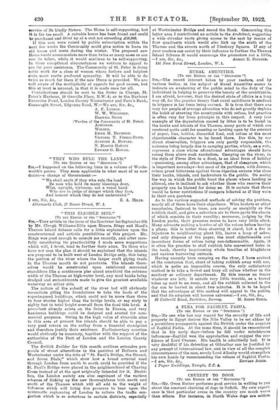RURAL AMENITIES.
[To THE EDITOR OP THE "SPECTATOR."] SIR,—The recent interest taken by your readers, and by various bodies, in the subject off Rural Amenities seems to indicate an awakening of the public mind to the duty of the individual in helping to preserve the beauty of the countryside. I am afraid, however, that the desired state of affairs is a long way off, for the popular theory that rural untidiness is confined to trippers is far from being correct. It is true that there are very few people of average education who do not greatly deplore the habit of strewing the countryside with refuse, but practice is often very far from principle in this respect. A very fair example of the depredation caused by litter is to be found in the banks and islands of the Thames, many parts of which are rendered quite unfit for mooring or landing upon by the amount of paper, tins, bottles, discarded food, and refuse of the most objectionable character to be found there. For this, by my direct observation, trippers are only partly responsible, the nuisance being largely due to camping parties, which, as a rule, represent a class whose educational advantages should have raised them above such vandalism. Camping on the river, in the style of Three Men in a Boat, is an ideal form of holiday —possessing, among other advantages, that of cheapness, which is important nowadays—but most of its partisans, with Jerome, evince great bitterness against those riparian owners who close their banks, islands, and backwaters to the public. On seeing the way in which the public treat the places where landing is allowed, one is inclined to ask whether those who reserve their property can be blamed for doing so. It is certain that there would be fewer restrictions if campers behaved as if they were In their own gardens.
As to the various suggested methods of solving the problem, nearly all of these have their objections. Wire baskets or other receptacles, fastened to trees, are nearly as unsightly as the rubbish itself, and give a suburban air to those parts the charm of which consists in their rurality; moreover, judging by the London parks, their presence seems to have very little effect. Many advocate making a bonfire of all the refuse before leaving a place; this is better than strewing it about, but a fire is injurious to neighbouring plant life, leaves a heap of ashes, and only disposes of the paper, the most objectionable and insanitary forms of refuse being non-inflammable. Again, it is often the practice to stuff rubbish into convenient holes in the bank, thereby imprisoning whole families of kingfishers and various burrowing animals.
Having recently been camping on the river, I hay* arrived at the conclusion that, short of taking rubbish away with one, which is quite an impossible course, the only satisfactory method is to take a trowel and bury all refuse whether in the sanitary or culinary department. By this means no traces whatever are left; it entails very little trouble, as a trowel takes up next to no room, and all the rubbish collected in the day can be buried in about two minutes. It is to be hoped that the advantages of this method will appeal to the public, and that its adoption will become universal.—I am, Sir, &e., 92 Cotterill Road, Surbiton, Surrey. M. SAXON Ssraz.


































 Previous page
Previous page